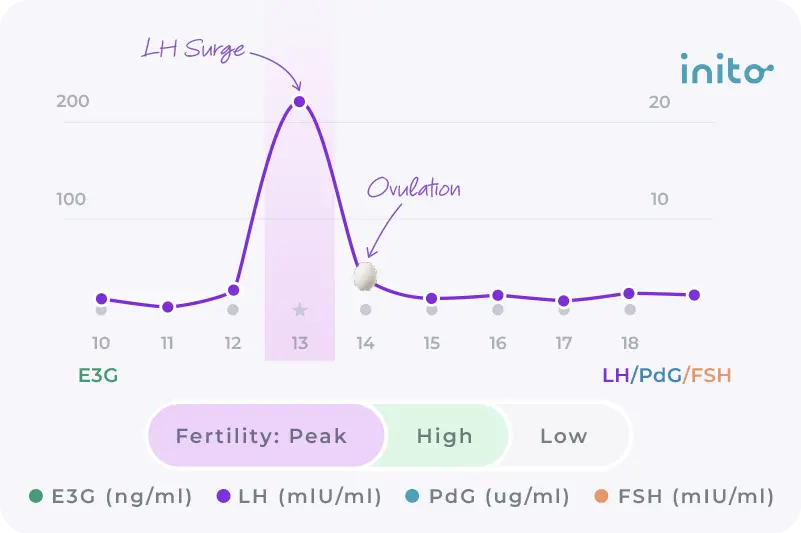Content table
Wondering if you’re in perimenopause? You’re not alone.
Maybe your cycles have started to change. Maybe you’re feeling symptoms you can’t quite explain. Or maybe you’re trying to get pregnant and things just feel different. Whatever brings you here, one thing’s for sure – this phase can feel confusing.
Let’s clear this up – there isn’t one single perimenopause test that gives a clear “yes” or “no” answer.
Often, testing is only recommended by your doctor if you’re trying to conceive (TTC) or if you’re having symptoms that might point to hormone imbalance.
Read on to learn more about the perimenopause test.
Key Takeaways
- There’s no single perimenopause test. Doctors look at your age, menstrual cycle, symptoms, and if you’re trying to conceive to determine what testing should be done.
- Perimenopause is the natural transition phase before menopause. It’s marked by abnormal periods and other hormonal changes.
- Perimenopause typically lasts several years.
- Tests like FSH, AMH, and AFC can help understand your egg supply. This is especially important if you’re TTC while experiencing symptoms of perimenopause.
- Many perimenopause symptoms can be managed through lifestyle changes or medical options like hormone therapy.
- If you have severe symptoms and are concerned, talk to your healthcare provider. They can offer personalized advice and rule out other health conditions.
What is Perimenopause?
Let’s start with what perimenopause actually means.
The word “peri” means “around.” So, perimenopause literally means “around menopause.”
Think of it as the transition period before your body fully reaches menopause. It’s a natural part of every woman’s life journey.
This menopause transition usually kicks off for most women in their mid-40s, often between 45 and 55 years old. But it can vary from person to person.
It’s not a sudden switch like you might think. It’s more of a gradual change, which means it isn’t always clear-cut. It starts with the first onset of menstrual irregularity and ends when you’ve gone a full year without a menstrual period. This is when you’re officially reached menopause.
This transitional period usually lasts about seven years. But, for some women, it can last as long as 14 years.
Know more: Can You Get Pregnant During Perimenopause?
Can You Test for Perimenopause?
Since perimenopause is a gradual transition that’s a natural part of life, it’s not usually “diagnosed” with a simple test. The exception? If the symptoms you’re experiencing are causing a lot of discomfort or inconvenience.
It’s important to remember that no single test or sign is enough to tell you if you’ve entered perimenopause. Your doctor will look at many different things. They’ll consider:
- Your age
- Your menstrual history (how your periods have been over time)
- What symptoms of perimenopause or body changes you notice
Additionally, if you’re trying to conceive, your healthcare provider might recommend some testing. This helps them understand your ovarian reserve and your hormonal status. (Your ovarian reserve refers to how many eggs you have left.)
Sometimes, testing may also be suggested if your doctor suspects another health condition (like thyroid disorders) that might be causing your menopausal symptoms or menopause-like symptoms.
How to Test for Perimenopause?
Tests done for perimenopause typically include –
Ovarian reserve testing
Your ovarian reserve refers to the quality and quantity of the eggs remaining in your ovaries. It essentially gives you a snapshot of your current fertility potential.
(Note: It doesn’t predict exactly when you’ll hit menopause or if you’ll get pregnant next month – but it can give you clarity on how to plan your pregnancy.)
Tests done to estimate your ovarian reserve include:
FSH (Follicle-Stimulating Hormone)
Let’s start with follicle-stimulating hormone, or FSH.
Did you know that a woman is born with a fixed number of eggs? You start with about 2 million eggs at birth. And that number drops to around 400,000 by the time you reach puberty.
This number keeps naturally going down as a woman gets older.
Even as your egg count gets lower, your ovaries still grow follicles in each of your menstrual cycles. These follicles are tiny sacs that hold eggs. But, since there are fewer eggs, fewer follicles grow each cycle.
Because fewer follicles are growing, they don’t produce as much estrogen. Your brain notices this and tries to give a stronger signal, sending out more FSH to encourage egg production.
So, if your FSH levels are increasing, it’s a sign that your egg supply might be decreasing.
FSH levels are usually measured on day 3 of your menstrual cycle.
Know more: FSH Levels: Normal Ranges + Chart by Age
AMH (Anti-Müllerian Hormone)
Another important marker is AMH, or anti-Müllerian hormone. This hormone is used to get a rough idea of how many eggs are left in your ovaries.
In general:
- High AMH: This usually means you have a larger number of eggs remaining in your ovaries. Sometimes, abnormally high AMH can also point to conditions like PCOS or ovarian tumors.
- Low AMH: This often means a lower number of eggs are left in your ovaries.
Low AMH can be a sign of:
- Perimenopause
- Primary Ovarian Insufficiency (POI)
- Endometriosis
- Autoimmune conditions
- Low vitamin D
Know more: Trying to Conceive? Here’s Why Your AMH Levels Matter
AFC (Antral Follicle Count)
The antral follicle count, or AFC that uses transvaginal ultrasound to measure the number of small follicles (called antral follicles) in your ovaries. A low AFC can indicate lesser number of eggs available for fertilization.
For the most accurate results, AFC is often used along with AMH and FSH to measure your fertility potential.
As you can see, a woman’s egg supply naturally decreases with age, which is why it’s so important to make every egg count.
And that’s where the Inito Fertility Monitor can really help. Inito measures 4 key fertility hormones like LH, estrogen, PdG, and FSH to track and confirm ovulation. It gives you clear, personalized insights, so you can time things right and make the most of every cycle.
Testing for other conditions that have overlapping symptoms
Sometimes, symptoms that seem like perimenopausal symptoms might actually be caused by other health conditions. It’s important to rule these out.
Conditions that can mimic symptoms of perimenopause mainly include thyroid disorders. Many women experience similar feelings, such as:
- Irregular periods
- Fatigue
- Insomnia
- Thinning of skin and hair
- Depression or anxiety
Your doctor will usually order a TSH (Thyroid-Stimulating Hormone) test to check your thyroid function. If the results are not normal, further testing might be needed to understand what’s going on.
A few other health conditions that may have menopause-like symptoms include anemia, autoimmune disorders, or even fibroids.
Your healthcare provider will consider these possibilities during your follow-up visit if your symptoms don’t quite fit the typical perimenopausal picture.
Know more: Signs Perimenopause is Ending And What To Do
Can You Delay the Onset of Perimenopause?
Unfortunately, no. You can’t delay perimenopause.
We’re all born with a certain number of eggs. As that egg supply naturally declines, your hormones begin to change. These hormonal changes are what lead to perimenopausal symptoms. It’s just how our bodies are designed.
We don’t have a say in our natural egg count. However, you can take steps to help maintain the quality of your eggs and boost your chances of pregnancy.
This means trying to limit your exposure to things that can be harmful, like:
- Toxins such as BPA (found in some plastics)
- Cigarette smoke
- Too much alcohol and caffeine
- Radiation
Also, focusing on a healthy lifestyle can generally boost your fertility and overall well-being. This includes:
- Following an anti-inflammatory diet (think lots of fresh fruits, vegetables, and lean protein)
- Staying adequately hydrated
- Getting enough sleep
- Enjoying regular exercise
Know more: How to Improve Egg Quality: Is it Really Possible?
Understanding Perimenopause Symptoms
It’s helpful to know what to look for when you’re entering perimenopause.
While every woman’s experience is unique, there are some common signs and symptoms of perimenopause.
Remember, these hormone levels fluctuate during this time, which is why your symptoms can change from day to day or month to month.
Some of the most common symptoms include:
Irregular periods
This is one of the first and most noticeable signs.
Your menstrual cycles might become longer or shorter, heavier or lighter, or you might skip periods entirely.
You might even experience spotting during perimenopause or perimenopausal bleeding that isn’t a full period. You may also have perimenopause spotting instead of a period.
Know more: Perimenopause Spotting When Wiping: Is it Normal?
Hot flashes and night sweats
These are sudden feelings of warmth, often spreading over your face, neck, and chest.
They are often accompanied by sweating. When they happen at night, they’re called night sweats. And they can definitely mess with your sleep.
Vaginal dryness
As estrogen decreases, the tissue in your vagina can become thinner and less elastic. This can lead to vaginal dryness, itching, or discomfort. This is often exacerbated during sex.
Mood swings
You might find yourself feeling more irritable, anxious, or down than usual. These mood swings are a common response to the shifting hormone levels.
Sleep disturbances
Even without night sweating, many women find it harder to get enough sleep during this time.
Weight gain
It can become harder to keep your weight stable, and some women notice weight gain. This can be especially true around the middle.
Joint pain
Some women experience aches and pains in their joints. This can be another one of the other menopausal symptoms.
Brain fog
Feeling a bit fuzzy in your thinking? Having trouble concentrating? Forgetting things easily? These can all be a part of the perimenopausal picture.
Nausea
While not as common as other symptoms, many women experience perimenopause nausea.
It’s important to remember that the intensity of these symptoms can vary greatly. Some women experience intense symptoms, while others have only mild ones.
When to See a Doctor
You should schedule a visit with your doctor if you are:
- Experiencing symptoms that are impacting your daily life. These could be:
- Disruptive hot flashes
- Extreme mood swings
- Constant sleep issues
- Concerned about irregular periods that are:
- Very heavy
- Frequent
- Last much longer than usual
- Worried about early menopause (before age 40)
- Trying to conceive and want to understand your fertility status during this menopause transition phase
- Just want to learn more about this natural transitional period and how to support your overall well-being as your body temperature and hormones shift
Your healthcare provider can provide valuable insights and guide you.
Perimenopause is a normal, natural part of life. There is no magic “perimenopause test” to say exactly when you’re entering perimenopause. However, understanding your body and working with your doctor can help you navigate this time. They can also help you as perimenopause is ending and you reach menopause.

FAQs
Yes. You can still get pregnant during perimenopause. Your periods might be irregular, and your hormone levels fluctuate. But, your ovaries can still release eggs (ovulate).
Until you’ve gone a full 12 months without a period, you should assume you can still get pregnant.
Know more: Can You Get Pregnant During Perimenopause?
Irregular periods and perimenopausal bleeding are common and normal parts of the menopause transition.
However, there are times when you should talk to your healthcare provider. You should seek their help if you experience:
- Extremely heavy bleeding (like soaking through one pad or tampon every hour or two for several hours)
- Bleeding that lasts longer than 8 days
- Bleeding that happens between your periods or spotting that’s not just light
- Periods that regularly occur less than 21 days apart
- Any bleeding after you’ve gone a full 12 months without a period (post-menopausal bleeding should always be checked out)
These signs may mean there’s an underlying issue that needs to be looked at and treated.
There isn’t one single perimenopause test that confirms perimenopause. However, your doctor might use certain hormone testing and blood tests to get a better picture of your hormone levels. This can help rule out other health conditions that might be causing the symptoms.
These tests include FSH, AMH, AFC, and estradiol.
You might see perimenopause test kits available for home use. These usually check your follicle-stimulating hormone levels in your urine.
However, these at-home kits are not considered reliable for confirming perimenopause. This is because your FSH levels fluctuate a lot during the perimenopausal period, even within a single month.
Perimenopause most commonly begins in your mid-40s. But some women might start noticing symptoms as early as their late 30s. This is sometimes called early perimenopause.
As estrogen levels decrease during perimenopause, it can lead to a variety of symptoms. Some common signs of low estrogen levels include:
- Hot flashes and night sweats
- Vaginal dryness and discomfort during sex
- Mood swings, irritability, and increased anxiety
- Sleep disturbances
- Irregular periods or skipped periods
- Thinning of the skin and hair
- Changes in sexual desire
- Increased risk of urinary or vaginal infections
- Aches and joint pain
Was this article helpful?
Perimenopause symptoms, severity, and healthcare seeking in women in the US
Perimenopausal Bleeding and Bleeding After Menopause
Unifying theory of adult resting follicle recruitment and fetal oocyte arrest
Age = egg quality, FSH level = egg quantity
Anti-Mullerian Hormone as a Predictor of Time to Menopause in Late Reproductive Age Women
Physiology, Thyroid Stimulating Hormone
Pregnancy, breastfeeding may lower risk of early menopause, NIH-funded study suggests












